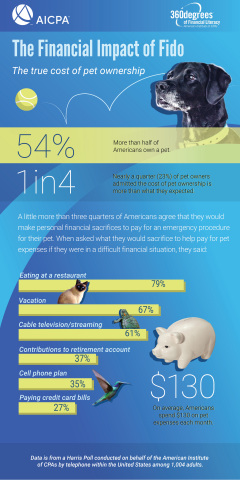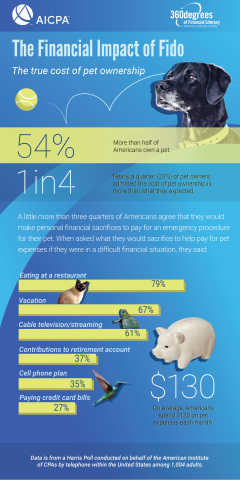NEW YORK--(BUSINESS WIRE)--How much is that doggie in the window? Before opening your home and your heart to a new pet this holiday season, it’s important to know how often you’ll have to open your wallet. Whether your companion is a puppy, parakeet, hamster, cat, fish, or iguana, pet ownership comes at a cost. A new Harris Poll conducted by telephone for the American Institute of CPAs (AICPA) found that more than half of Americans (54 percent) have a pet in their home and the cost of that companionship is impacting their finances.
The survey found that, on average, American pet owners spend $1,560 per year on just their pet’s routine care (feeding, grooming, boarding, scheduled visits to the vet), based on an average monthly cost of $130. When you consider that more than half of Americans have less than $1,000 in their savings (according to a recent GoBankingRates survey), it’s clear that some pet owners are sacrificing their own financial goals to cover their pet costs.
“Owning a pet can be an incredibly rewarding experience, but it’s also a long-term financial commitment,” said Greg Anton, CPA and Chair of the AICPAs National CPA Financial Literacy Commission. “It is important to incorporate both routine and unpredictable pet expenses into your budget to help ensure your own financial plan will not be disrupted.”
Nearly a quarter of pet owners (23 percent) admitted the cost of pet ownership is more than they expected. Food, toys and routine care are foreseeable costs, however, there are additional expenses, such as emergency medical care or boarding, that can arise without warning. If an emergency expense were to present itself, three-quarters of American pet owners (76 percent) said they would make financial sacrifices to pay for it. Four-out-of-five (79 percent) shared that they would stop eating at restaurants and two-thirds (67 percent) would give up their vacation to pay for pet related expenses if they were in a difficult financial situation.
Once a pet becomes part of the household, it’s doubtful people would ‘cancel’ their pet to save money like they would a cable television subscription. In fact, three-in-five American pet owners (61 percent) said they’d do the opposite and sacrifice their cable and TV streaming services to pay for their pet expenses. A third of pet owners (35 percent) would even sacrifice their cell phone plan.
While saving money on cable and cell phone plans could actually be advantageous, some American pet owners would take steps to help their pets that could negatively impact their finances. A little more than one-third (37 percent) said that they would sacrifice contributions to their retirement account to pay for pet-related expenses, putting their own future financial wellbeing at risk. Even more alarming, one-in-four American pet owners (27 percent) would forego paying their credit card bill to pay for their pet’s expenses, leading to potential penalties, interest rate hikes and a lowered credit score.
Individual pet owners said that to pay for emergency expenses they would be willing to “give up everything in the house,” their “quality of groceries” and even “cut back on the amount of money spent on grandchildren.” A few pet owners went all in, saying that they’re willing to “give up anything” to ensure their pet is taken care of. While you are committing to caring for your pet once you bring it into your home, planning ahead can help keep this commitment from sending you into financial distress.
“As you consider bringing a pet into your family, understand that you’re making a substantial investment of both time and money,” added Anton. “The costs of your ‘new family member’ will go far beyond bringing them home so it’s important to budget for the lifetime of the pet.”
Pet ownership can be a fulfilling experience that should be approached with knowledge of the costs. To help Americans fully understand the financial commitment that comes with bringing a pet into their home, the AICPA’s National CPA Financial Literacy Commission has the following tips:
- Be honest with yourself financially – If you are struggling to pay off your student loans and have credit debt piling up, does it really make financial sense to get a pet? Pets are great but they are meant to help relieve stress, not add to it due to financial difficulties.
- Do your research – Though the cost of routine care may be predictable, it varies widely from animal to animal, and even from breed to breed, across the full spectrum of family pets. Know ahead of time the probable cost of care that will come with your companion.
- Make a budget: “pre-pet” & “post-pet” - Include all related expenses, i.e. food, treats, leash, crates – including tank for fish, lizards, etc.—toys, vet visits, grooming and other services such as boarding and day care. If your pet will require a habitat powered by electricity, be sure to factor in the impact it will have on your utilities bill.
- Be prepared – If you’re worried about unforeseen costs, use an emergency savings calculator to help you regularly set aside funds, or consider getting pet insurance.
- Buy in Bulk – Items such as food, treats and preventive medicine can be purchased in bulk, reducing the overall cost per unit.
For more tips and information on managing your personal finances, visit 360finlit.org.
Survey Methodology
This Harris Poll was conducted by telephone within the United States between September 29 and October 1, 2017, among 1,004 adults (502 men and 502 women aged 18 and over) including 504 interviews from the landline sample and 500 interviews from the cell phone sample. 526 identified as pet owners. Figures for age, sex, race/ethnicity, education, region and household income were weighted (using data from the Current Population Survey) where necessary to bring them into line with their actual proportions in the population.
About the American Institute of CPAs
The American Institute of CPAs (AICPA) is the world’s largest member association representing the CPA profession, with more than 418,000 members in 143 countries, and a history of serving the public interest since 1887. AICPA members represent many areas of practice, including business and industry, public practice, government, education and consulting. The AICPA sets ethical standards for its members and U.S. auditing standards for private companies, nonprofit organizations, federal, state and local governments. It develops and grades the Uniform CPA Examination, offers specialized credentials, builds the pipeline of future talent and drives professional competency development to advance the vitality, relevance and quality of the profession.
The AICPA maintains offices in New York, Washington, DC, Durham, NC, and Ewing, NJ.
Media representatives are invited to visit the AICPA Press Center at www.aicpa.org/press.
About the Association of International Certified Professional Accountants
The Association of International Certified Professional Accountants (the Association) is the most influential body of professional accountants, combining the strengths of the American Institute of CPAs (AICPA) and The Chartered Institute of Management Accountants (CIMA) to power opportunity, trust and prosperity for people, businesses and economies worldwide. It represents 650,000 members and students in public and management accounting and advocates for the public interest and business sustainability on current and emerging issues. With broad reach, rigor and resources, the Association advances the reputation, employability and quality of CPAs, CGMAs and accounting and finance professionals globally.




